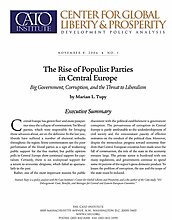Rather, one of the most important reasons for public discontent with the political establishment is government corruption. The pervasiveness of corruption in Central Europe is partly attributable to the underdevelopment of civil society and the concomitant paucity of effective restraints on the conduct of the political class. Moreover, despite the tremendous progress toward economic freedom that Central European countries have made since the fall of communism, the role of the state in the economy remains large. The private sector is burdened with too many regulations, and governments continue to spend some 44 percent of the region’s gross domestic product. To lessen the problem of corruption, the size and the scope of the state must be reduced.
The Rise of Populist Parties in Central Europe: Big Government, Corruption, and the Threat to Liberalism
Central Europe has grown freer and more prosperous since the collapse of communism. Yet liberal parties, which were responsible for bringing those advances about, are on the defensive. In the last year, liberals have suffered a number of electoral setbacks throughout the region. Some commentators saw the poor performance of the liberal parties as a sign of weakening public support for the free market, but public opinion polls in Central Europe show continued support for capitalism. Certainly, there is no widespread support for a return to economic dirigisme, which failed so spectacularly in the past.

This work is licensed under a Creative Commons Attribution-NonCommercial-ShareAlike 4.0 International License.

